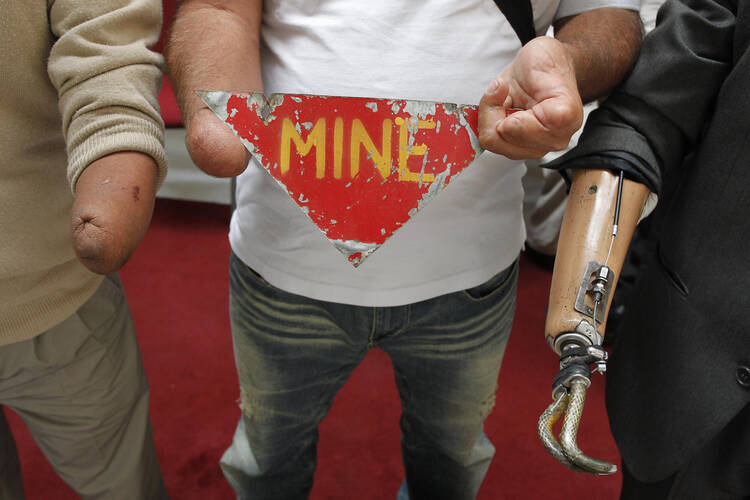While most of the world has already ratified the U.N.'s Ottawa Convention banning the use of land mines, the United States stands among the hold-outs with Russia, Iran, China, Israel, Vietnam, Egypt and a collection of other mostly Arab and Middle and South East Asian states. A decision may finally be coming from the Obama administration on whether or not the United States will join the 1997 convention and humanitarian agencies have begun applying pressure for a signing ceremony. "A decision by the Obama Administration to ban landmines now is long-overdue,” said Steve Goose of Human Rights Watch, chair of the United States Campaign to Ban Landmines, a coalition of more than 400 non-governmental organizations. “U.S. support would help to convince other countries that have not joined the treaty to reconsider their stance. It would strengthen the norm against these weapons by helping to ensure they are not used in the future."
This week U.S. bishops joined the global chorus--not for the first time--urging a U.S. ratification of the treaty. Bishop Richard E. Pates of Des Moines, Iowa, the chair of the U.S. bishops’ Committee on International Justice and Peace, believes it's time the U.S. joined the crowd, signed the treaty and began dismantling its landmine stock.
In a letter on Feb. 12 to National Security Advisor Susan E. Rice, he urged the Obama administration to conclude its policy review on banning anti-personnel landmines and move on to sign and ratify the Convention, reminding Rice that "on April 4, 2011, you commemorated the International Day for Mine Awareness and Assistance and said that 'failure to deal with unexploded ordnance exacts a far greater cost in terms of security and human potential.' You noted U.S. leadership in clearing landmines and concluded that 'we must resolve to strengthen our efforts to ensure that the earth is sown with the fruits of opportunity and prosperity, not dangerous remnants of war.'"
He added, “Please urge the President to exercise his leadership on banning landmines by acceding to the Ottawa Convention....Be assured that our Conference would affirm this action and work vigorously for ratification of a treaty that rids the world of these weapons which cause long-term, irreparable, and indiscriminate harm.”
Land mines have been widely used in hundreds of global conflicts, but for years after the shooting has stopped they remain a menace to anyone unfortunate to come upon them, primarily children, farmers and farm animals that are often a primary source of food or income creation for indigenous farmers. In total, 161 countries are States Parties to the 1997 Convention on the Prohibition of the Use, Stockpiling, Production and Transfer of Anti-Personnel Mines and on their Destruction (also known as the Ottawa Convention or Mine Ban Convention/Treaty). The U.S. Campaign to Ban Landmines reports that the convention's signatories and parties include every member of the European Union, every member of NATO (except the United States) and other key U.S. allies such as Afghanistan, Australia, Iraq and Japan. The United States is one of only 35 countries that have not joined the Mine Ban Treaty and the only country in the Western Hemisphere aside from Cuba that has not joined.
The Holy See is among the U.N. states urging that the convention be ratified. Bishops Pates in his letter to Rice notes that "in 2012, Pope Benedict XVI launched an appeal to raise awareness about the problems of landmines saying, “I encourage everyone to be committed to freeing humanity from these terrible and devious weapons....”
Bishop Pates adds, "Pope Francis, with his emphasis on peace and protection of innocent civilians, would certainly agree."
Despite the inattention or the outright resistance of three presidential administraions to the 1997 ban, the United States in practice has been fairly anti anti-personnel mines. It has not used anti-personnel mines since 1991 (in the first Gulf War), has not exported them since 1992, has not produced them since 1997 and is the biggest donor to mine clearance programs around the world. Despite those polices, the United States still retains millions of stockpiled anti-personnel mines for potential future use, according to the U.S. Campaign to Ban Landmines.
"It’s clear that there is widespread support for the United States to do the right thing on landmines and relinquish these weapons,” said HRW's Goose. “Acceding to the treaty would reinforce President Obama’s stated commitment to international humanitarian law, protection of civilians, arms control and disarmament and multilateralism.”








